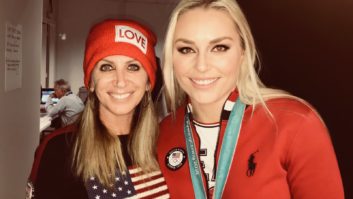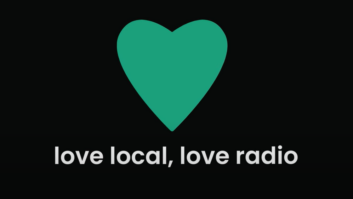
Photo by Tom Butts
VANCOUVER, British Columbia — Think the Winter Olympics are all about television? Don’t tell that to Rogers Radio and Corus Québec.
Between them, the two Canadian broadcast groups provided some 200 hours of Olympics radio coverage in both English and French. (Both Rogers Radio and Corus belong to Canada’s Olympic Broadcast Media Consortium, which was headed by Rogers radio and television stations and the CTV national television network.)
“We have quite a bit of coverage from Vancouver,” said Nelson Millman, executive producer of Rogers Radio’s English-language Olympics programming. “We are broadcasting French-language Olympic programming from start to finish,” added Mario Cecchini, vice president of Corus Québec.
English plan
Rogers Radio is one of the largest private radio groups in Canada and the proud holder of the title “Official Radio Network of Vancouver 2010.” Its de facto Olympic network will be carried across Canada on 10 Rogers-owned stations in Toronto; Calgary, Alberta; Whistler and Vancouver, British Columbia; Halifax, Nova Scotia; St. John and Moncton, New Brunswick; and Kitchener, Ontario.
An additional 50 non-Rogers stations across Canada have signed up to take some or all of its Olympic coverage.
“We are doing live play-by-play from Vancouver of all the Canadian men’s hockey games and the women’s gold medal games, plus other selected events,” said Millman. “In some cases, we simulcast the audio from TV broadcasts by our consortium partners, especially if there’s a breaking sports story and we need to cut to it live. In other instances, we will be using our own broadcasters.”
All told, Rogers had 25 radio broadcasters and technicians at the Games, managing interviews with the athletes and reporting from the major venues. On average, Rogers Radio aired two Olympic updates live every hour for the duration of the Games.
Rogers’ radio personnel used a mix of microphones and digital recorders to capture audio, which was then edited on laptop computers.
To get the stories live to the nation, reporters either went to one of the consortium’s television OB trucks and plugged into its communication channels or they used a broadcast line at the International Broadcast Centre (IBC) in downtown Vancouver.
“We also use ftp sites on the Web: Reporters can just drag-and-drop their audio files onto the link, and we receive and open their files at our Toronto production headquarters,” said Millman. “In truly rushed cases, there’s this technology called ‘the cellphone’ that we can always use to go live from anywhere.”
To say that Millman is excited about Rogers Radio’s Olympics coverage is an understatement. “This is the most ambitious sports programming that we have done on this scale,” he said. “It is a great chance to show what radio can in the age of HDTV; especially for people who want to stay on top of the Games but aren’t able to watch it on TV all the time.”
Francophone strategy
Corus Entertainment also has radio and TV stations across Canada. But with Rogers Radio having snapped up the English radio rights for Canada, Corus decided its best option was to acquire the French-language rights to the Games.
Corus Québec is producing the company’s Olympic coverage. Its de facto Olympic network is focused on this province, with carriage on 10 stations in Montréal, Québec City, Lévis, Gatineau, Saguenay, Sherbrooke and Trois-Rivières.
“In the lead-up to the Olympics, we introduced our listeners to the Québécois athletes who will be taking part,” said Mario Cecchini. “These are the people our listeners want to know about and to track during the competition.”
BBC Radio 5 Live in Vancouver Canada certainly wasn’t the only country with a radio presence at the Olympics. For instance BBC’s Radio 5 Live was on site, getting results and interviews back to the United Kingdom.
The news and sports station started its Olympics coverage with a live hour-long preview program from Vancouver on the Thursday before the Games started. During the event, said Jamie Broughton, winter sports producer/reporter for Radio 5 Live, “We also had live commentary on 5 Live of our main medal hopes, such as the women’s two-man bobsleigh, skeleton and the snowboard cross.”
The sports desks on the 5 Live Breakfast show also broadcast from the Games.
In contrast to those broadcasters with presentation space in the prestigious (and expensive) International Broadcast Centre (IBC) and at the Whistler Media Centre for the Alpine events, “We don’t have a studio,” said Broughton. “But we do have ISDN broadcast positions in [an apartment in] Whistler and in the IBC.”
Including Broughton, three Radio 5 Live staff are on hand for the Games. They recorded to Marantz solid-state recorders and edited on their laptops using Adobe Audition software.
To get Radio 5 Live’s feeds to air, “We mainly use ISDN to broadcast and send material back to London,” Broughton said. As well, “We have a Comrex high-quality 3G phone system, plus an Inmarsat M4 satellite kit, which is connected to an ISDN kit. We also upload load audio via the BBC’s Traffic system, which allows audio to be sent online.”
For Broughton, the biggest challenge in covering the 2010 Winter Games was the time difference. When it’s noon in London, it’s 04:00 in Vancouver; that is an eight-hour difference that takes some getting used to.
— James Careless For the Games, Corus covered the major sporting events, with an emphasis on hockey. “We have CKAC sports personalities Martin McGuire and Dany Dubé in Vancouver,” he said. “They will interview the players face-to-face, and broadcast all of Team Canada’s men’s and women’s games from our own booth at the Canada Hockey Place.”
Besides live hockey coverage, Corus Quebec covered the Opening and Closing Ceremonies, and provided its ten Olympic network stations with hourly updates with news, interviews and features with athletes, daily recaps and lookaheads to the next day’s action.
On the technical side, the three-person Corus Québec production crew worked out of its IBC facility, with audio being sent to Montréal via landline.
“Our reporters used digital recorders and microphones, recording to MP3s and emailing them to us in Montréal; unless they needed to go live by cellphone,” said Cecchini. “All of our programming is then sent to our member stations over landline. It’s not complicated, but it is very effective. No one has ever done this level of French-language Olympic radio coverage in Québec before.”
Proud moment
Collectively, Rogers Radio and Corus Québec provided Canadian listeners with around-the-clock coverage of the 2010 Winter Games. For those at work, driving or otherwise unable to get to a TV, their programming was a godsend; especially when the Canadian hockey teams were playing. In this hockey-mad nation, schools and businesses have shut down during major day-time hockey broadcasts.
“We are proud to be breaking new ground for Canadian commercial radio,” said Mario Cecchini. “This is truly one of those times when radio proves that it has a unique role to play.”
Related:
“Westwood One Preps for Winter Olympics” (January 2010)










